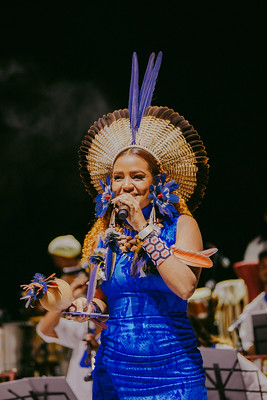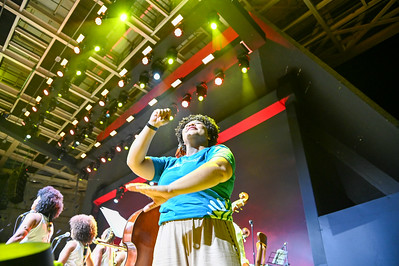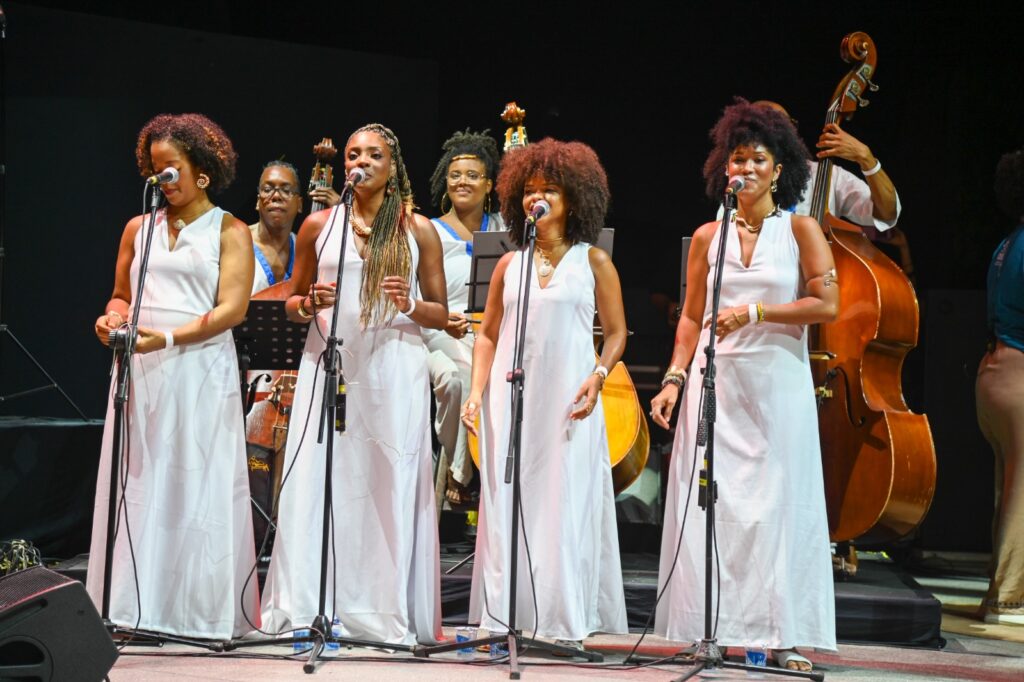

On 4 April 2025, an unforgettable encounter between music and the defence of rights took place at the Acoustic Shell of Salvador’s Castro Alves Theatre. The 5th edition of the Music and Human Rights show, presented by the Ecumenical Coordination of Service (Coordenadoria Ecumênica de Serviço: CESE), was attended by about 5,000 people who enjoyed an unprecedented performance by Marisa Monte and the Afro-symphonic Orchestra conducted by Maestro Ubiratan Marques.
With tickets sold out and the audience in rapture, the show celebrated not only the beauty of art, but also the transformational power of culture for the struggle for social justice. All the income from the event was ringfenced for CESE’s Small Projects Programme (link in Portuguese), which supports the projects of grassroots organizations in rural and urban communities around the country.
A musical and political experience



The night began with the power and sophisticated sound of the Afro-symphonic Orchestra, whose arrangements ring with ancestry, identity and resistance. Marisa Monte then took to the stage, taking the audience on a musical journey packed with emotion. The repertoire ranged from her greatest successes, such as Magamalabares, Vilarejo, Ainda Bem, Velha Infância, Beija Eu to classics, such as Preciso Me Encontrar and Carinhoso, all put together in Afro-orchestral arrangements that speak of the richness of Brazilian music.
Using the power of her indigenous ancestry, young singer and poet Beatriz Tuxá, a member of the CESE team, welcomed the audience with her maracas, celebrating the month of indigenous people’s culture and struggle.
Music as message and resistance
For Sônia Mota, CESE’s Executive Director, the event symbolizes the union between beauty and awareness-raising: “The aim of the Music and Human Rights project is to enable the audience, through a show, to reflect on the importance of continued work in the defence and promotion of rights,” she declared.
Another goal is to mobilize local resources for the organization. For Sônia, this struggle is not easy. There are many challenges to obtaining financial support with so many activities and demands from around the country. “We receive more than 800 proposals per year and support approximately 300. There are few partnerships aimed at human rights in Brazil, because, unfortunately, there is still a lot of disinformation and prejudice.”
For her, with its lightness and joy, music helps to drive the resistance of vulnerable populations: “Because joy is also a form of resistance. And music has the capacity to reach into homes and hearts with this powerful message about social struggles,” she concluded.
Maestro Ubiratan Marques also reflected on the connection between culture and rights: “Our orchestra has the face of Bahia, the face of Brazil, which was born through activism. We would like to thank all the social movements here, the black, quilombola and indigenous movements. The Afro-symphonic Orchestra only exists because of them. It was born with this purpose – to take care of our gardens, our folks, our people.”
In the final moments of the show, Marisa Monte touched the audience’s hearts with her words:
“Many thanks to CESE. We’re helping so many people with this encounter, in a totally charitable night that will transform so many lives. I’d like to thank them for the chance to be here. Tonight, we’ve proved the transformational power of art and music. The power to transform society. So, many thanks for providing this incredible moment for us to transform and improve the lives of people, children and families throughout Brazil. Many thanks for being the tool and instrument of this.”
A crowd that sang till the end
“When a crowd sings together, they always sing in tune,” Marisa Monte said at the end of the show, touching the audience’s hearts. And this is exactly what it was: a night of collective singing, where beauty, ancestry and engagement walked hand in hand.
CESE, after more than 50 years of work, reasserted its commitment to the defence of human rights at this event. Through art and culture, the organization has amplified voices, generated impact and mobilized resources to strengthen the hundreds of projects that arrive at the organization every day, to tackle inequalities and construct alternatives for good living.
CESE would like to thank everyone who participated, supported and shared this celebration. May such energy continue to echo and inspire new action for dignity, equity and justice. Until next time!
Check out the images from the 5th edition of the Music and Human Rights show.
Repertoire of the “Afro-symphonic Orchestra invites Marisa Monte” show
The maestro, singer and musicians performed the following songs:
Exu
Orin
Nabeleli
bejis
Maracatu do Congo
Magamalabares
Maria de Verdade
Vilarejo
Panis et Circenses
Ainda Bem
Beija Eu
Ainda Lembro
Preciso Me Encontrar
Carinhoso
De Mais Ninguém
Depois
Segue o Seco
Velha Infância
Oxalá / Lenda das Sereias — with the audience on their feet, ending the night in communion and celebration

